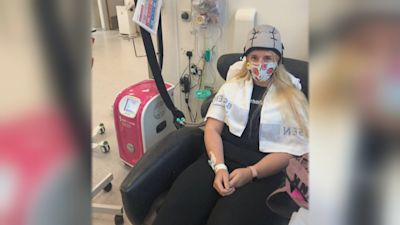The impact of Covid-19 on cancer patients: The nurse who had her diagnosis delayed

There are growing concerns about the long-term impact that the Covid crisis could have on cancer patients. It's estimated that millions of screenings were delayed when all but essential NHS services were halted during lockdown.
It means people with cancer have been diagnosed later. In one case, a nurse from Kent has been told she will not be able to have children after a postponed smear test revealed that she had cervical cancer.
It's been a tough journey for Destiny Wade from Crayford in Kent. After being diagnosed with cervical cancer, she's had 12 weeks of chemo and radiotherapy.
But Destiny says, getting the diagnosis in the first place was the real challenge. Her smear test was cancelled because of Covid, even though she had abnormal bleeding.
Destiny Wade
Many cancer screening services were put on hold during lockdown. Cancer Research UK estimates that around 3 million screenings didn't happen because of Covid. And fewer screenings means fewer patients sent for treatment.
Across the South East in May, for example, there was a 50% drop in the number of cancer referrals. That means that around the country, 31,000 fewer cancer patients started treatment between April & July - compared with the same period last year.
Destiny, who works as a paediatric cancer nurse, knew her symptoms were getting worse, so she went to A&E. Within a fortnight she was diagnosed with cervical cancer - she had a 7cm tumour.
It's not only women at risk. Plumber Melvyn Ratcliffe delayed seeing his GP before he was diagnosed with prostate cancer. He's now in remission, but worries others will ignore symptoms or miss appointments, and may not be so lucky.
Melvyn Ratcliffe
NHS England say cancer treatments are now back to usual levels and routine screenings have resumed. Cancer specialists are keen to stress the service is open for everyone.
Dr Jeanette Dickson, President of the Royal College of Radiologists said, "The simple message for people who have symptoms they are concerned about is - you are not a burden. We the NHS need you to be diagnosed with whatever you have at the earliest possible opportunity, so that we have the best chance of giving you the best treatment"
"There was a great deal of worry about bringing people to a hospital in a time of Covid crisis in March. And that's not as much of a problem now, we've learned how to protect services, how to make them safe for patients to come. I think how we manage things is much much better from the lessons learned, the problem we have is capacity."